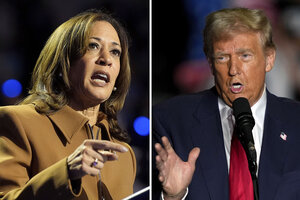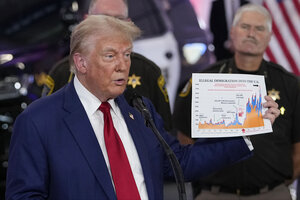What Tim Walz brings to the table as Kamala Harris’ VP pick
Loading...
| Washington
Vice President Kamala Harris has selected Minnesota Gov. Tim Walz as her running mate, choosing a popular Midwestern governor who brings an authentic connection with rural white voters.
Mr. Walz is an Army National Guard veteran, former high school geography teacher, and state-winning football coach. He served six terms in Congress before becoming governor.
Why We Wrote This
In choosing Minnesota Gov. Tim Walz as her running mate, Kamala Harris gains a folksy former soldier, teacher, and football coach who could help her presidential campaign in key Rust Belt states.
He brings to the table a plainspoken Midwestern vibe, which could help win over voters skeptical of a San Francisco progressive like Ms. Harris.
“Vision, joy, and compassion are very much part of what Tim Walz is, and he also translates that through the eyes of the working people of this country,” says former Minneapolis Democratic Mayor R.T. Rybak. “The country is going to have to get used to seeing a vice president in a schlumpy T-shirt and cargo pants. ... And they’re going to have to get used to seeing a vice president who can fix a car or go hunting.”
Mr. Walz began the rapid veepstakes race as a little-known governor, but quickly gained support from progressives, many of whom wanted to find another Rust Belt candidate to block the more centrist Pennsylvania Gov. Josh Shapiro from the ticket.
Vice President Kamala Harris has selected Minnesota Gov. Tim Walz as her running mate, choosing a popular Midwestern governor who brings an authentic connection with rural white voters.
Mr. Walz grew up on a farm in small-town Nebraska and moved to Mankato, in southern Minnesota, to teach high school geography and coach football in the 1990s. His teams won two state championships. He was elected to Congress in 2006, winning a red-leaning rural district. He is an Army National Guard veteran who served more than two decades; when he won his House seat he had the rank of command sergeant major, making him the highest-ranking enlisted soldier to ever serve in Congress.
He brings to the table the folksy, plainspoken vibe of a Midwestern former schoolteacher, which could help win over voters skeptical of a San Francisco progressive like Ms. Harris.
Why We Wrote This
In choosing Minnesota Gov. Tim Walz as her running mate, Kamala Harris gains a folksy former soldier, teacher, and football coach who could help her presidential campaign in key Rust Belt states.
Former Minneapolis Democratic Mayor R.T. Rybak has known Mr. Walz since his first run for Congress – and says he’s the same “incredibly authentic human being” that he was in 2005.
“Vision, joy, and compassion are very much part of what Tim Walz is, and he also translates that through the eyes of the working people of this country,” Mr. Rybak says. “The country is going to have to get used to seeing a vice president in a schlumpy T-shirt and cargo pants. ... And they’re going to have to get used to seeing a vice president who can fix a car or go hunting.”
That demeanor and his governing record made Mr. Walz a favorite of progressives and populists in the truncated search for a Harris running mate. His description of former President Donald Trump and his running mate, J.D. Vance, as “weird” in recent interviews quickly caught on with Ms. Harris and other Democrats.
She cited his biography and personality for why she selected the governor.
“One of the things that stood out to me about Tim is how his convictions on fighting for middle class families run deep. It’s personal. As a governor, a coach, a teacher, and a veteran, he’s delivered for working families like his own,” she said in a statement announcing the pick.
The Walz track record
Mr. Walz was a relatively centrist congressman during his time in the House. He supported the Keystone XL oil pipeline, worked across the aisle to pass a bipartisan veterans suicide-prevention bill into law in 2015, and was a darling of the National Rifle Association in his early career. He’s a gun owner and avid hunter. But he has shifted to support more restrictions, like an assault weapons ban.
He’s won a number of tough House races in a rural district that leans Republican and two hard-fought gubernatorial elections in Minnesota, a liberal-leaning but competitive state.
He worked across the aisle with Republicans who controlled the Legislature in his first term to secure more funding to fight opioid addiction and cut middle-class taxes. And in the wake of George Floyd’s murder in 2020 by a police officer in Minneapolis, he helped negotiate a bipartisan law putting new restrictions on police use of force in the state.
It was striking that Mr. Walz’s selection drew praise from across the Democratic Party – both progressive Rep. Alexandria Ocasio-Cortez of New York and centrist West Virginia Sen. Joe Manchin cheered him. Mr. Manchin called Mr. Walz “the real deal,” and said he “will bring normality back to the most chaotic political environment that most of us have ever seen.”
The protests and riots that broke out in Minneapolis after Mr. Floyd’s death are a vulnerability for him, however: Mr. Walz later admitted that the state’s initial response was an “abject failure.” Mr. Walz also faces criticism for his handling of the COVID-19 pandemic. A local nonprofit siphoned off a quarter-billion dollars in federal funds meant to feed children during the pandemic, the largest pandemic fraud case in the United States; a jury found five people guilty in June of fraud, bribery, and money laundering, and dozens of others face charges.
A recent legislative audit found that his administration’s Department of Education failed to conduct proper oversight to prevent the fraud.
Republicans are already attacking Mr. Walz on these issues.
“Tim Walz let BLM rioters burn buildings to the ground. At the same time, he set up ‘snitch phone lines’ to report Minnesotans to the police for going to the store or having a barbecue during COVID. Just like Kamala Harris, he’s dangerous radical,” Republican Sen. Tom Cotton of Arkansas posted on X on Tuesday.
How Walz came from behind to win veepstakes
He began the rapid veepstakes race as a little-known governor, but quickly gained support from progressives, many of whom wanted to find another Rust Belt candidate to block the more centrist Pennsylvania Gov. Josh Shapiro from the ticket. Mr. Walz has earned plaudits from the left for his successful push in recent years for legislation to protect abortion access in Minnesota, create paid family leave, provide free school meals to all Minnesota students, offer free college tuition for all students from families that earn less than $80,000 annually, legalize recreational marijuana, and force public utility companies to use green energy. And he has close ties with organized labor.
Mr. Trump’s campaign immediately sought to paint him as a far-left politician.
“From proposing his own carbon-free agenda, to suggesting stricter emission standards for gas-powered cars, and embracing policies to allow convicted felons to vote, Walz is obsessed with spreading California’s dangerously liberal agenda far and wide,” Trump campaign press secretary Karoline Leavitt said in a statement.
Some pundits criticized Ms. Harris for not picking Mr. Shapiro, both because of the missed opportunity to shore up her support in Pennsylvania, perhaps the most important swing state in the country, and because Mr. Shapiro, a first-term governor, has a more moderate record that could win over independents.
But while Mr. Walz and Mr. Shapiro share similar views on Israel, Mr. Shapiro has been more outspoken in criticizing some protests against Israel’s war in Gaza, making him more of a target for criticism from the left.
Minnesota Attorney General Keith Ellison, a progressive who has known Mr. Walz since they were both elected to Congress in 2006, praised his home-state colleague for being able to build bridges with various disaffected groups.
“He’s a listener; he believes in sitting down with people and talking to them. Let me tell you, there’s a lot of communities who have felt historically marginalized in Minnesota who Tim Walz has built bridges with,” he says. “His basic impulse is to sit and listen and try to understand. He’s great at that.”
And Mr. Shapiro, an attorney from the Philadelphia suburbs, didn’t offer the blue-collar appeal that Mr. Walz brings – and Ms. Harris lacks.
“I always think of him [as] giving off the football coach vibes,” says Minnesota Democratic-Farmer-Labor Party Chair Ken Martin, who has known Mr. Walz for two decades.
Mr. Martin says that Mr. Walz’s bio and skill set will make him an asset in Wisconsin, Michigan, and Pennsylvania – three “blue wall” states crucial to winning the presidential election.
“There’s no one better equipped to speak to those Midwestern values, with Midwestern sensibilities and sort of a folksiness than Tim Walz, who is one of the best communicators I’ve seen,” he says.
Editor’s note: This story has been updated and expanded during the day of publication.
More of our 2024 election coverage
In Pennsylvania, ordinary citizens combat political violence
Before the attempt on former President Donald Trump’s life, there had been rising incidents of harassment and threats of violence against public officials. Here’s how some people are working to dampen the risks.
Joe Biden’s legacy rests with Kamala Harris. Can he help her win?
For the next 100 days, a sensitive issue for the Harris campaign and the White House is, Where and when should Joe Biden be seen? It matters not just for the election, but also for his own legacy.
Six issues Kamala Harris is campaigning on – and 5 she’d rather avoid
Kamala Harris has the opportunity to rebrand herself in the eyes of voters. Her focus will include protecting abortion rights – and drawing a contrast to Donald Trump on justice.
New GOP platform reflects Trump’s dramatic reshaping of the party
A party platform, while not binding, gives an indication of policy priorities and a road map for governing. Republican changes since 2016 reflect a populist shift, dialing back long-standing party stances on abortion, guns, and fiscal responsibility.
Trump guilty verdict marks first-ever criminal conviction for a former president
A felony conviction does not preclude Donald Trump from running for or serving again as president. But it promises to scramble an already fraught campaign season, even as other criminal lawsuits against the former president are postponed.

















